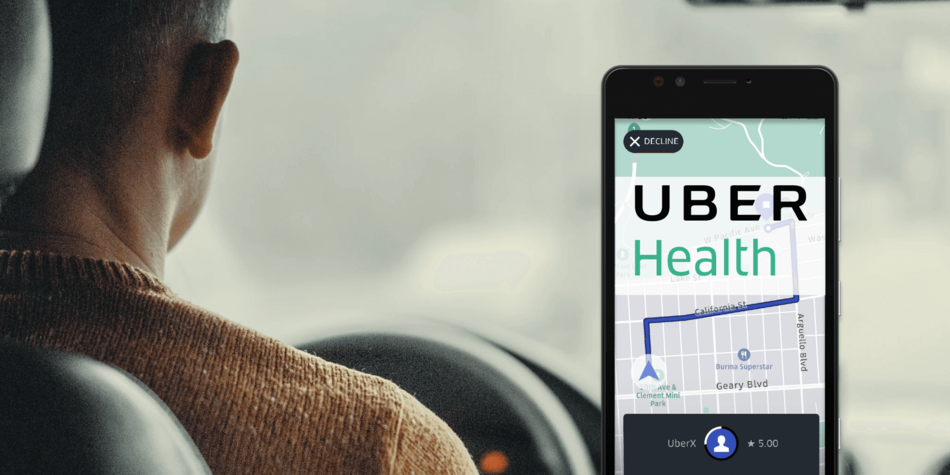Uber Health: transportation app for patients and doctors
We’ve examined the new Uber’s project – Uber Health – a service focused on reliable, comfortable non-emergency transportation for patients and gathered the key takeaways for building a successful application on the borderline of healthcare and automotive industries.
For many people, Uber has become a good, and sometimes the only transportation alternative. The San Francisco based company operates in 83 countries and over 674 cities worldwide via Uber’s websites and mobile apps. Uber cars are used for peer-to-peer ridesharing, taxi services, and food delivery. The statistic shows the Uber’s market share of rideshare drivers in the United States as of February 2018 was 87.6%.
In May 2018 Uber hit five billion rides per day mark. And the ambitions of the network transportation company grew much bigger. Now the company is going to extend its presence in the market of transportation services in the healthcare domain.
What is Uber Health?
According to the Community Transportation Association, approximately 3.6 million Americans miss or delay visits to the hospital due to transportation issues, and 950,000 of those are children. Missed medical appointments cost the US healthcare system $150 billion each year and the no-show rates are 30%.
The new Uber’s project – Uber Health – is a service focused on reliable, comfortable non-emergency transportation for patients. Uber healthcare project is based on a dashboard that allows healthcare professionals to order rides for their patients compliant with Health Insurance Portability and Accountability Act (HIPAA) standards.
Uber’s medical transportation service is to create patient-friendly experiences and eliminate losses due to missed medical care appointments. Uber medical transport can be an efficient solution for small practices and care providers without own account transport.
A new study revealed that Uber services for healthcare may reduce ambulance use by as much as 7% as not every ride to hospital implies medical attention en route. If medical supervision is not necessary, ride sharing can be a much cheaper option.
Moreover, ride-sharing may reduce the volume of ambulance calls and free specialized medical vehicles and staff for those people who really need medical assistance on the way to the hospital. Uber for patients, especially senior citizens, means mobility and a safe and easy way to get to a medical facility. Uber for doctors means coordination of appointments and the possibility to schedule follow-up visits in advance.
How does Uber Health work?
The process can be described in 3 simple steps.
- A healthcare facility associate uses the Uber Health dashboard to book a ride on-demand or for a future appointment for the patients having no car of their own.
- The trip details are given to the passenger by a text message or a call at the time the ride is booked; then the trip details are given once again when a driver is on the way to pick them up.
- The passenger is picked up and dropped off on schedule.
What are the key features of Uber Health?
According to the service provider, the features of Uber Health are:
- Flexible ride scheduling for patients, caregivers and staff. The dashboard allows scheduling rides for patients immediately and in advancing (up to 30 days) both for patients and medical staff. The dashboard allows booking, rescheduling, and viewing the rides.
- Patients can access the service without the Uber app installed. Riders do not need to have the Uber Health app installed on their smartphones, they don’t even need to have a smartphone, as everything is based on text messages.
- Simple billing allows fast and easy reporting allowing control spending on the rides. All transportation costs are managed in one place with a single monthly bill.
- HIPAA compliance allows healthcare organizations to sign Business Associate Agreements (BAAs) with Uber. Uber Health General Manager Chris Weber says that Uber Health stores all information about the trip only on the client-side and HIPAA-compliant servers, so data is never stored on the Uber’s side.
What are the advantages of Uber Health for healthcare organizations?
In the long run, it’s all about significant costs reduction and improved services deliverability:
- Lack of transportation can be a significant barrier to medical care provision.
- On-time visits mean the efficient utilization of healthcare professionals working time. Lower no-show rates and appointment cancellations also lead to loss reduction.
- Ridesharing is cheaper than using ambulances in those cases where specialized equipment and medical supervision is not necessary during a ride.
- The ridesharing dashboard allows creating convenient schedules both for doctors and their patients. At that healthcare, associates can monitor the rides and update the schedules regaining flexibility.
- One further advantage is the Uber Health API which enables easy integrations into existing healthcare products, for transportation to be scheduled for follow-up appointments while patients are still at the healthcare facility.
How can Uber Health API be used by healthcare facilities?
API, i.e. application programming interface is a set of subroutine definitions, protocols, and tools for building application software. It is a set of methods of communication between various software components.This API gives developers the tools and information to build solutions tailored to specific needs of the healthcare providers.
Uber Health API integration allows smooth scheduling and efficient healthcare professionals to work by means of incorporating ridesharing directly into the IT systems, apps or tools used in the facility.
Uber has got detailed guidelines for developers where one can find the information necessary to integrate Uber into apps and the Developer Dashboard for registering applications. It is possible to create apps using Curl, Python, Java, iOS, and Android.
Through the API the following core capabilities of the Uber app are available:
-
- Selecting a service
- Specifying pickup and dropoff locations
- Viewing time and price estimates
- Requesting a ride
Because it relates to healthcare, ensuring confidentiality is crucial. Therefore the developer dealing with Uber API integration must have not only necessary experience and skills for app development but also be aware of all HIPAA (the U.S. government’s medical-confidentiality regulations) compliance requirements.


